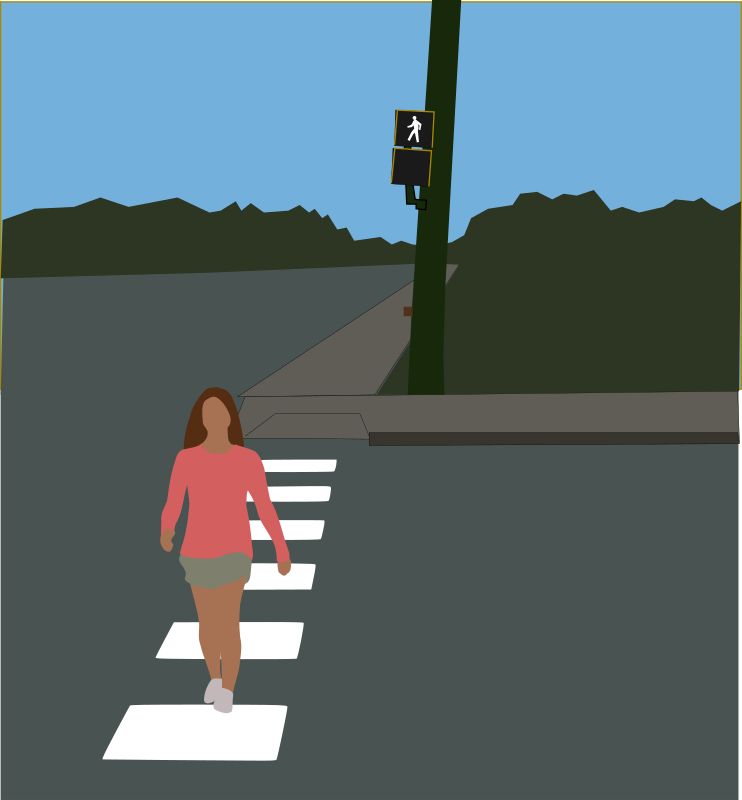I was crossing the street the other day when I heard a deep voice behind me. Turning around, I saw a stranger, smiling at me from his car. Not the kind of smile you want to see. Like he was trying to lure me. All while I was just trying to get home. It sickened me to my core. I was furious, terrified and sad at the same time. What if I don’t want to be leered at or sexualized on the street? What if I just want to be left alone?
That isn’t the first time this has happened. I get text messages from my friends after they’ve been catcalled while walking home from school. I know a girl who was approached at a bus stop by a man who repeatedly verbally harassed her and called her slurs.
People say it’s not that big of a deal, but you can’t speak for someone else. Like this viral video of a woman walking around New York City, which sparked a debate whether the 100 instances she was catcalled were really catcalling. A Fox News reporter even said “nothing was disrespectful there.” Of course it’s disrespectful, because all those harassers saw her as a sex object and nothing more. And by diminishing how a woman feels about being catcalled, that is only furthering the problem.
Others claim that this harassment is actually complimenting the woman. “There is nothing more that a woman wants to hear than how pretty she is,” Steve Santagati said on CNN. A compliment is polite, respectful and empowering to the person who receives it. It is not threatening or belittling. And catcalling is only perpetuating this bigger issue of rape culture. It’s casually sexualizing women’s bodies, something that not just anyone should have the right to do.
According to Inside Southern, “rape culture is perpetuated through the use of misogynistic language, the objectification of women’s bodies, and the glamorization of sexual violence, thereby creating a society that disregards women’s rights and safety,” all of which occur through catcalling.
The sad thing is, it happens every day. With catcalling, we are reduced to sex objects, and we are scared because we don’t know what might happen next. Assault. Kidnapping. Rape. It’s all possible.
Even school dress codes reinforce the fact that it’s the victim’s fault because of the clothes they are wearing, like shorts or sleeveless tops. Clothes are not an invitation for catcalling. It is the assaulter’s fault for consciously making the decision to call out a woman’s body or threaten her.
According to a survey by The Atlanta Journal-Constitution, one in three men don’t think catcalling is sexual harassment, and two in three men don’t think “repeated unwanted invitations to dinner, drinks or dates” is sexual harassment. The survey also noted that 1 in 5 men don’t think sexual harassment is a fireable offense. The thing is, catcalling, which is a part of sexual harassment, has huge reprecussions.
Street harassment severely affects a woman’s daily routine and mental health. 72% of women in the US change their method of transportation due to experiencing harassment on the street, according to a survey on sexual harassment from Cornell University. Women have also been reported to change their clothing, avoid social events, feel distracted at school or work, and even change jobs or move cities due to incidents of harassment. Even at WIS, students can feel uncomfortable or exposed because of catcalling, or being called out because of their clothes.
Sometimes people just look us up and down. Something subtle like that may not seem imposing, but it still makes us feel exposed, vulnerable and lesser. A man telling a woman to smile because it makes her look more attractive, perpetuates rape culture. He is ordering her to do something simply for his pleasure when he looks at her. It is a privilege for men to shield themselves from these experiences. For us it’s our reality.
According to the Cornell survey, 84% of women worldwide experience their first street harassment before the age of 17. My parents taught me at a young age to be constantly aware of my surroundings. And I’m not allowed to bike home after dark because, as a girl, I’m more prone to assault.
Women are highly aware of the fact that the man who appears to be following them home could severely injure them. There are products created for us, like Birdies, which is an alarm that can be activated to attract attention if you feel uncomfortable. I carry pepper spray in my purse wherever I go. This is the reality for women in this world. Why can’t a woman walk down the street without being catcalled? Why must she constantly worry about predators lurking around her?
It’s not just women experiencing this. But this is an issue mainly affecting women. According to the chart below, 76% of women have been verbally sexually harassed, compared to 35% of men. It’s evident that it’s usually men doing the catcalling, and women are the ones who are affected.

If you are a man, you may appear a threat to someone, even if you don’t mean to. Respect personal space. Be aware that calling someone out publicly on their body is not ok in general. It makes individuals feel exposed and violated. People need to stop making side comments that seem like a joke. They are not jokes — they are perpetuating rape culture and harming the self esteem of so many girls.
If you witness something on the street, take in the situation and use the 5 Ds Hollaback suggests: Distract, Delegate, Document, Delay, and Direct. Ignore the harasser and start engaging with the victim. Find someone with authority to intervene. If it is safe, record what is going on. After the event, ask how if the victim needs any support. Confront the harasser. Don’t be a bystander in the face of harassment.
My story is only one of many. It is one piece in the large puzzle that makes up rape culture. I’m asking you, please, listen to what people have to say. Even if you’ve never catcalled anyone or been catcalled, this is still everybody’s issue. Everyone has to do their part in order to end this.
Catcalling is objectifying women and reducing us to sex objects, but we are more than that. If people manage to understand that, one person at a time, we can leave a long term impact on society. One where women are not catcalled every day. Where women feel safe, respected and equal. We can change rape culture, starting with catcalling.
By Naomi Breuer







































































